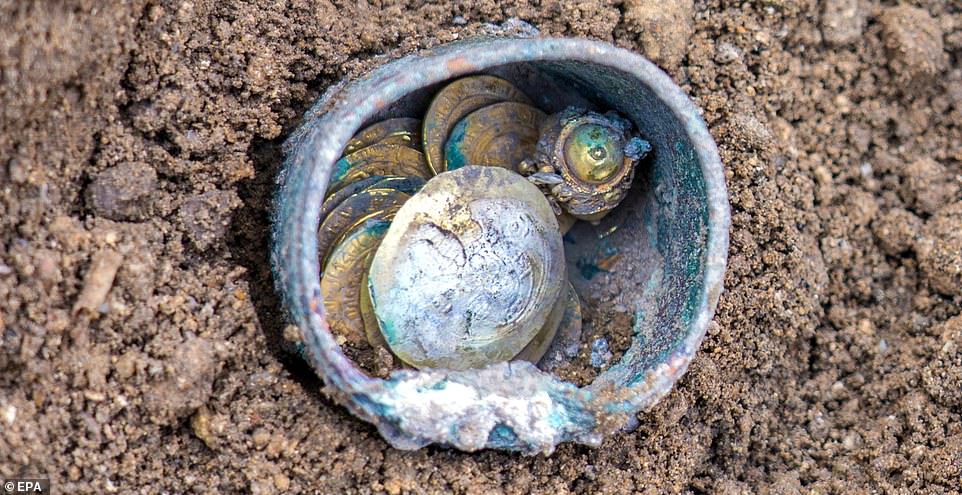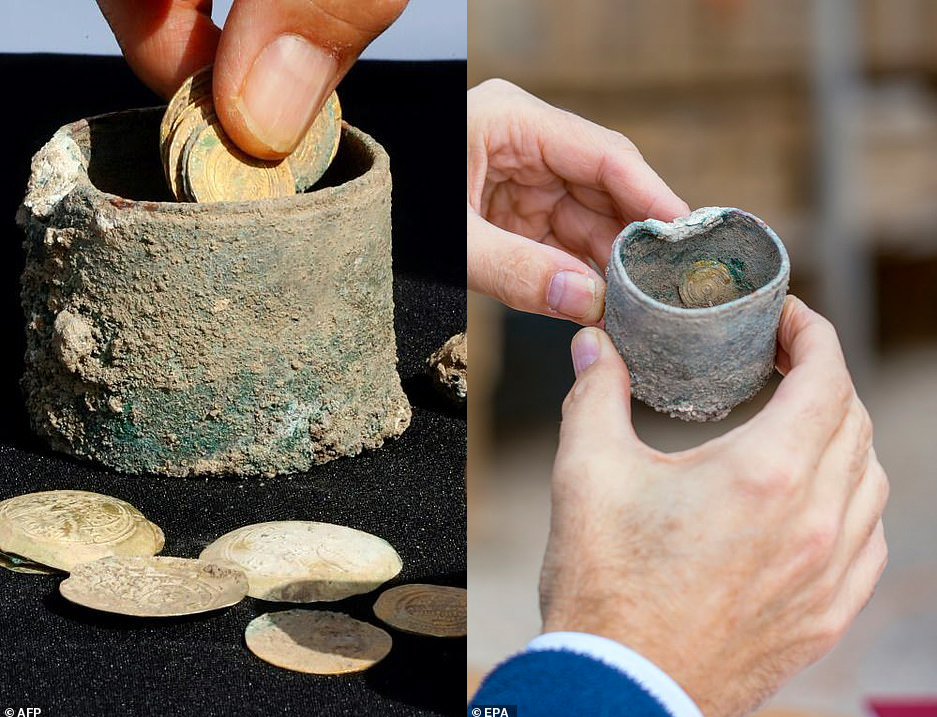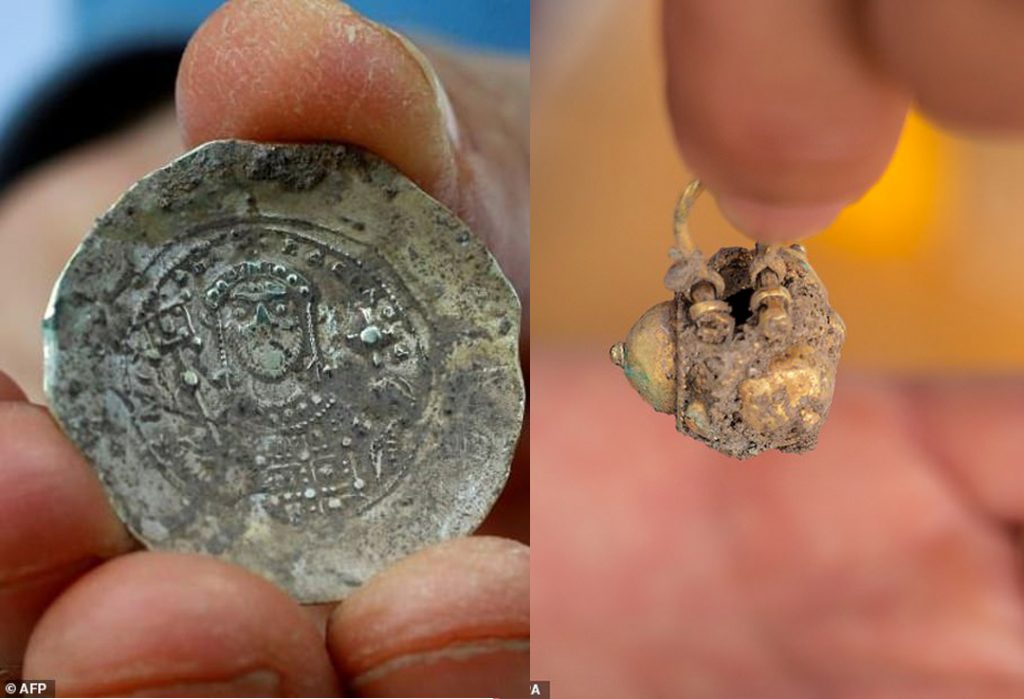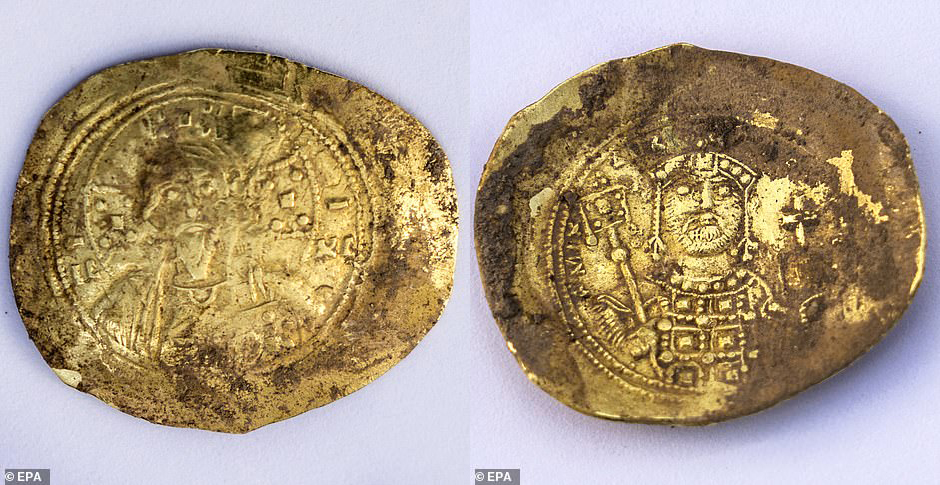900-Year-Old Gold Coins, Earring Found In Israel

900-Year-Old Gold Coins, Earring Found In Israel
The ancient Mediterranean port of Caesarea in northern Israel has uncovered rare gold coins, a golden earring, possibly left and never recovered when the Crusaders conquered the city 900 years ago.
The Israeli Antiquities Authority announced that a small bronze pot with 24 gold coins and an earring was discovered.

According to the authority, the house in a neighbourhood dating from some 900 years during the Abbasid and Fatimid periods was found between two stones on the side of a well. The IAA’s directors, Peter Gendelman and Mohammed Hatar, said that the coins were discovered in the cache at the end of the 11th century.
That makes it possible ‘to link the treasure to the Crusader conquest of the city in the year 1101, one of the most dramatic events in the medieval history of the city’, an IAA statement said.
The Crusades were a series of religious wars with the stated goal of restoring Christian access to the holy places in and near Jerusalem – a sacred city for Jews, Christians and Muslims.

The crusade which captured Caesarea was led by Baldwin I of Jerusalem, who ruled the Crusader kingdom between 1100 and 1118. It followed the First Crusade and is often known as the Crusade of the Faint-Hearted due to the number of people who joined it having turned back from the First Crusade.
After being crowned in Jerusalem on 25 December 1100, Baldwin fought several battles between Jerusalem and the port city of Ashkelon. Caesarea fell on 17 May 1101 after a siege of 15 days. According to the Antiquities Authority, most inhabitants of the city were massacred by Baldwin I’s army between 1100 to 1118 CE.

Baldwin I also captured Arsuf in 1101, Acre in 1104, Beirut in 1110, and Sidon in 1111. By 1112 he had captured all the coastal cities except Ascalon and Tyre. The authority said it can be presumed that the treasure’s owner and his family likely died in the Caesarea massacre or were sold into slavery.
The bronze pot in which the trove was held for the past millennium, which is itself a valuable item, was secreted between stones in a 1.5 meter-deep well. The discovery was made during an excavation and conservation project at the Caesarea World Heritage site.

It was located in a house in a neighborhood dating to the Abbasid and Fatimid period, 900 years ago. This bronze pot, which shows indications of once having an original metal lid, was given a makeshift ceramic stopper before being placed into the watering hole, according to The Times of Israel.
‘The people broke a piece of ceramic and put it in as a stop-gap lid so the coins wouldn’t fall out,’ Dr. Robert Kool, coin expert at the authority, told the paper.
‘It really seems to add up to the Crusader conquest, which was a pretty dramatic event.’ They would have been unable to return to the site of the cache and retrieve their hidden gold.
‘According to contemporary written sources, most of the inhabitants of Caesarea were massacred by the army of Baldwin I (1100-1118), king of the Crusader Kingdom of Jerusalem,’ it added.
‘It is reasonable to assume that the treasure´s owner and his family perished in the massacre or were sold into slavery, and therefore were not able to retrieve their gold.’
The cache is of a unique combination of coins not yet seen in Israel consisting of two types of coins: 18 Fatimid dinars, well known from previous excavations in Caesarea, where it was the standard local currency of the time,’ said Dr. Robert Kool, coin expert at the authority.
‘And a small and extremely rare group of six Byzantine imperial gold coins.
‘Five of the coins are concave and belong to the reign of the Byzantine Emperor Michael VII Doukas (1071-1079 CE).’


Caesarea was constructed in the first century BC by King Herod at a time that Judea was part of the Roman empire. Through the centuries, Caesarea was conquered several times.
First built by Herod the Great between 20 and 11 BC, Caesarea proved an important port city to several conquerers, including the Roman and Byzantine empires.
Archaeologists think the pot of gold was stashed as invaders ransacked the city, some 900 years ago.